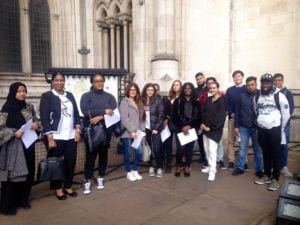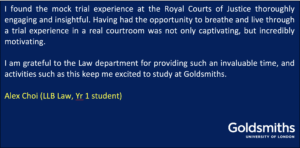
Goldsmiths LLB Law students at the Royal Courts of Justice, holding written guidance about their role as defence and prosecution counsel, judge, member of the jury, defendant and other parties in the criminal trial.
As part of the English Legal System in a Global Context module, LLB students recently got a chance to participate in a professional activity by acting out a criminal trial for ‘murder’, in a real court room at the Royal Courts of Justice.
As part of this constructive and fun day, the students, with their lecturer, Dr Dagmar Myslinska, got a glimpse of the history and function of the impressive RCJ building, which houses the High Court and the Court of Appeal of England and Wales. Opened by Queen Victoria in 1882, it is one of the largest court buildings in Europe. On their way into the building, students were also fortunate to unexpectedly witness a procession of newly-appointed judges and court officials, in their finest regalia.
Students learned first-hand about observing protocol in a court house, which unfortunately includes a no-pictures policy. They were introduced to court room decorum and to the intricacies of the English court system by a representative of the National Justice Museum, the award-winning museum and education provider on law and justice topics.

Students then took on various roles in a mock criminal trial, which was inspired by real events. In their roles as a judge, jurors, barristers, solicitors, witnesses, and an usher, students were faced with the task of deciphering complex facts and challenging legal issues and to ultimately decide a defendant’s fate. Depending on their roles, students practiced public speaking, deliberation, organisational, and analytical skills. Having prepared their strategies beforehand with the support of their solicitors, defence and prosecution barristers debated with confidence, drawing on evidence to highlight weaknesses in their opponents’ arguments. As witnesses, students presented relevant facts objectively and were also tasked with improvising on the spot as needed. The judge impartially presided over the proceedings and kept order, with the usher’s assistance. All of this hard work paid off as the mock trial was conducted professionally and smoothly, and the jurors reached a verdict.
Conducting the mock trial in a real court room at the RCJ inspired the students’ enthusiasm and confidence, and made textbook learning of criminal law come to life. As part of our pioneering module design, more professional activities are to follow throughout the year, aimed at immersing the students in the practice of law.